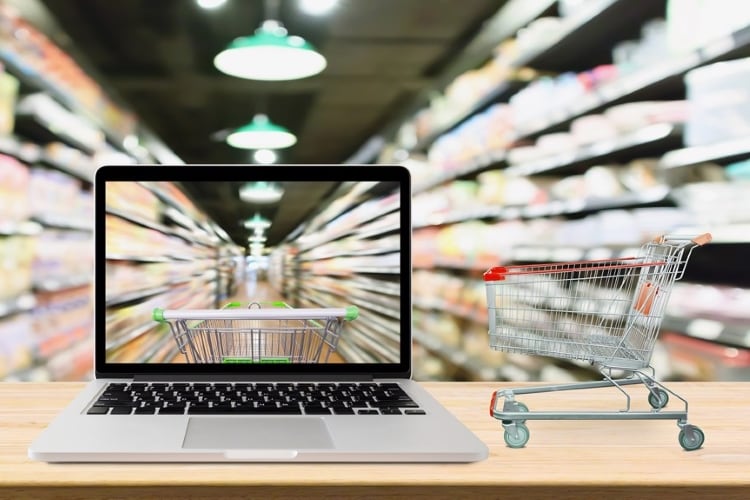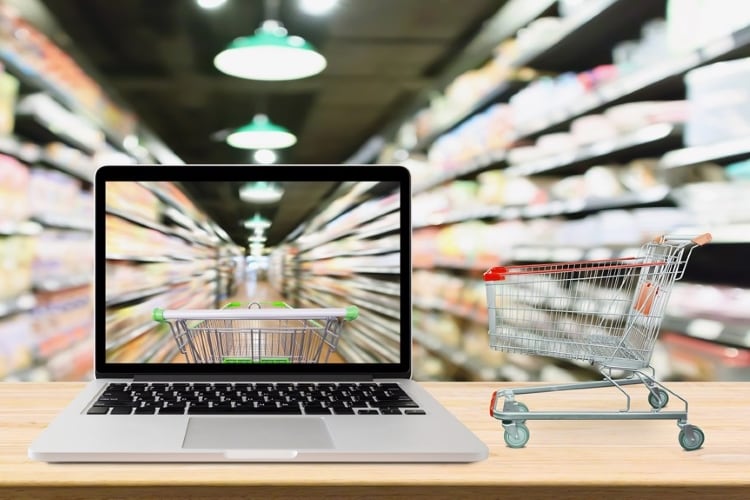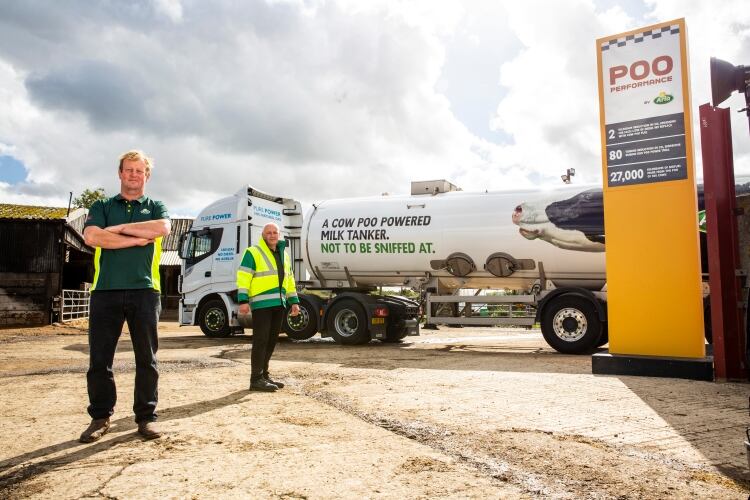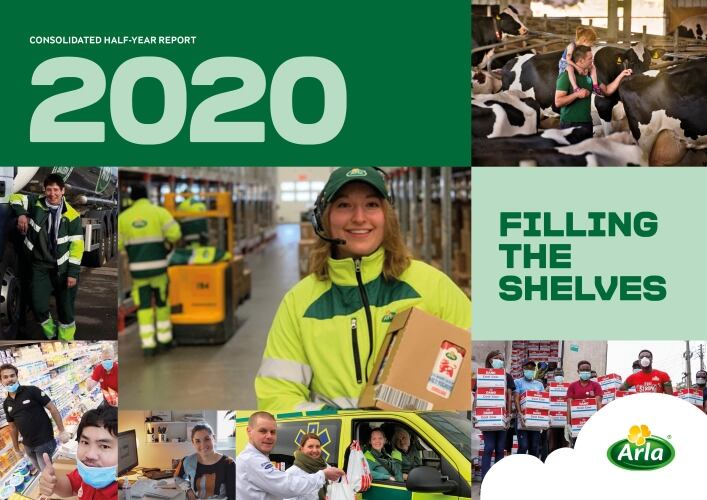In 2020, Arla grew global branded sales volumes by 7.7% due to the cooperative's global portfolio of brands such as Arla and Lurpak and strong market positions. Despite revenue losses in Food Service and Global Industry Sales, total group revenue was €10.6bn ($12.85bn), compared to €10.5bn ($12.73bn) in 2019.
Due to the financial position, Arla’s board of directors has proposed to the board of representatives to pay out 1.75 eurocent per kg milk for the supplementary payment, 0.75 eurocent higher than the standard 1.00 eurocent per kg milk.
Arla’s pre-paid milk price to farmer owners was kept relatively stable. However, 2020 was a challenging year for many Arla farmers due to tough cost environments and added complexities on farms.
Arla’s performance price - which measures the value Arla creates per kilogram of owner milk, was 36.9 eurocent in 2020 compared to 36.6 eurocent in 2019.
As consumers were forced to stay home for much of the year, the number of family meal occasions increased significantly, and many consumers turned to cooking and baking. This boosted sales of Arla’s global brands Lurpak, Arla and Puck delivered strategic branded volume growth of 14.6%, 3.0% and 11.7% respectively.
“This is without doubt the most challenging crisis Arla has ever operated within. Due to the cooperatives agility, we were able to reshape our business and redirect large milk volumes almost overnight to meet the increased demand for our quality household dairy products, while minimizing the negative impact from other market sectors such as foodservice,” Arla Foods CEO Peder Tuborgh said.
The increase in retail offset the overall declines in Arla’s foodservice and global industry sales business. Foodservice sales saw an initial drop of 45% in the spring of 2020, then regained momentum over the summer, weathering the second and third waves of Covid-19 with further shutdowns of workplaces and across the hospitality sector. Arla’s branded foodservice business in Europe was overall 12% down from 2019.
Arla focuses its activities on four commercial segments. Despite global logistics and supply chain challenges due to COVID-19, both the Europe and International segments strengthened the quality of business, gained market positions and grew core brands due to retail demand and e-commerce sales in 2020.
Arla Europe represents 60% of the business and delivered overall branded volume driven growth of 5.9% driven mainly by Lurpak, Arla and Starbucks and with highest branded growth in the UK, Germany and the Netherlands. Overall Europe revenue increased to €6.413bn ($7.77bn) compared to €6.353bn ($7.7bn) in 2019.
Arla International represents 19% of the business and delivered branded volume driven growth of 11.6% driven mainly by Lurpak, Puck and Starbucks. The MENA region delivered branded volume driven growth of 20.1%. Overall revenue increased to €1.975bn ($2.4bn) compared to €1.802bn ($2.18bn) last year.
Arla Foods Ingredients (AFI), a 100% owned subsidiary of Arla, increased the value-add ingredient business driven by growth in the Pediatrics and Medical Nutrition segments. The food segment and Child Nutrition Manufacturing business delivered slightly below 2019 levels due to Covid-19 impact and delays. Overall AFI revenue increased to €716m ($868m) compared to €710m ($860.8m) in 2019.
As a result of increased sales in retail, Global Industry Sales, (formerly Trading), which is business-to-business commodity sales, experienced weakened prices along with a decrease in the overall share of milk sold by 2.3 percentage points compared to 2019. Revenue decreased to €1.541bn ($1.87bn) from €1.662bn ($2.01bn).
Arla’s transformation and efficiencies program Calcium secured savings of €130m, primarily from supply chain efficiencies and optimized marketing spend, but also due to reduced expenses as many office employees worked from home. The accumulated Calcium savings are now €354m since the launch in 2018 with the end goal of more than €400m in sustainable savings by the end of 2021.
In 2020, Arla said it took further sustainability action across its value chain, including packaging, moving from fossil to renewable energies in its supply chain and piloting new technologies in its logistics fleet.
The most prominent step forward was the implementation of Climate Checks on 93% of all Arla farms across seven European countries. The climate data delivered by farmer owners creates one of the world’s biggest externally verified climate datasets on milk production and will help farmers benchmark and inspire each other in their work to lower their emissions even more.
Expectations are 2021 is expected to be another challenging year as COVID-19 continues to impact the global dairy industry, the global economy and people’s livelihoods globally. Arla expects core brands to continue to deliver branded volume growth, but at a more modest rate than in 2020.
The company noted that 2021 will also be the first year with the new Free Trade Agreement between the EU and the UK, which removed significant risk to Arla. The business has a range of plans in place and said it is well prepared to handle the non-tariff barriers in the new agreement.
Arla plans to invest €700m ($848.7m) in 2021 driven by structural investments, Calcium initiatives and Arla’s sustainability agenda. Major projects include the completion of the powder tower in Pronsfeld, Ger-many, continuing the mozzarella capacity increase project in Branderup, Denmark, and upgrades to the production site in Bahrain, as well a continuation of strategic investments in AFI.
“2021 will be another year of uncertainty and global disruption as the COVID-19 crisis stretches into the year and the first signs of a recession are starting to show. We need to be vigilant in ensuring the health and safety of our people and farmer owners while securing business continuity and growth. But it is also a year where we hopefully will see the world open up again as vaccines are rolled out so I am cautiously optimistic for 2021,” Tuborgh said.
Group revenue outlook for 2021 is expected to be between €10.3bn ($12.5bn) and €10.6bn ($12.85bn), net profit share will be in the range of 2.8 to 3.2%, and leverage is expected to be in the lower end of target range of 2.8-3.4.
Arla will publish its annual report and CSR report on February 25.




